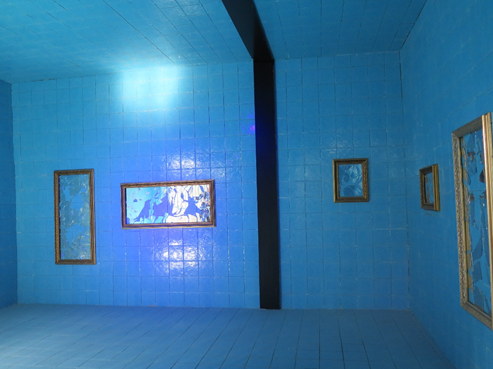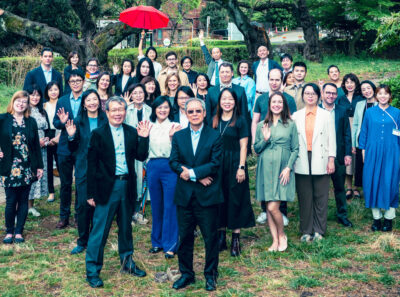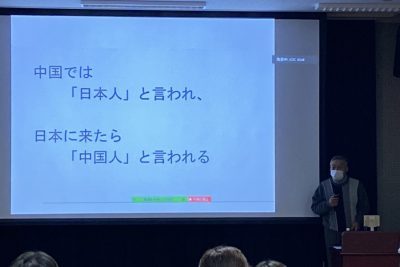Discoveries in Our World of Reversals and Everyday Contradictions

The blue-tiled room in the photograph shows artwork at the Museum of the Qasr Prison in Iran. The building, which had been used as a prison from 1929, was opened as a museum in 2012, with the prison space used to exhibit works of art. The transformation of a prison, which separates people from society, into a museum, a space open to the public, gives visitors the strange feeling of a world turned inside out.
During the coronavirus crisis, “reversal phenomena” are being witnessed all over the world, in which conventional common sense no longer applies. These reversal phenomena include animals coming back out into the streets during lockdowns where people stay inside their homes, prisoners being temporarily released in Italy or Iran to prevent the spread of the disease, and people creating their own collections in games while physical museums have been closed. And, with online meetings and classes, being connected to social spaces such as our company or school even while in private spaces is becoming a normal of our lives.
Furthermore, in this coronavirus crisis, our everyday lives are also full of contradictions. A photograph taken in Iran, where women are obliged to wear a hijab in front of men in public places and outside of the home, shows a female teacher conducting a class online while wearing shorts, with her hijab only covering the upper part of her body that is visible on screen. Even in Japan, demand for “presentable homewear” is said to be on the rise due to the increase in online communication. The concept of putting on “homewear,” clothes originally designed not to be worn outside, to be “presentable” would have been unthinkable in the pre-coronavirus crisis world.
While new values have emerged, contradictions that Japanese society should immediately resolve have also come to light. The term used to refer to the “stay home request” in Japan since the beginning of the coronavirus crisis is a compound that combines elements referring to both “self-restraint (jishuku)” and a “request (yōsei).” Furthermore, contradictions continue to cause confusion: despite the call to avoid the three “Cs” (closed spaces, crowded spaces, and close-contact settings), there has been almost no mention of packed trains; and, a campaign promoting travel is also being implemented despite requests to refrain from travel as much as possible during the summer vacation.
At first glance this might seem to have been caused by the coronavirus crisis, but one could also say that the contradictions present in society prior to the crisis have become more noticeable than before. Perhaps, in truth, the time had already come for us to reconsider the social frameworks and structures that we had taken for granted in the modern world, such as the enclosure and exhibition of animals in zoos, the separation of criminals from society in prisons, and the expectation within school education that students all behave “the same way” in the classroom. Many hints for thinking about the future were hidden in the events held at Tokyo College last year. I would like to take a look back over pre-coronavirus lectures with a post-coronavirus perspective.
Pre-coronavirus crisis lectures at Tokyo College
The following events that left a particularly lasting impression: (1) President of the Republic of Iceland Guðni Thorlacius Jóhannesson’s lecture “The Might of the Weak: The Role of Small States in International Relations and the Case of Iceland,” (2) Sir Anthony J. Leggett’s lecture on “Why Can’t Time Run Backwards,” and (3) the symposium “What is a human being? Thinking about the digital revolution, genomic revolution, and human society.”
(1) The President of the Republic of Iceland’s speech overturned the common-sense view that states with greater military force or territory have a stronger position in the international community than states with more limited military force or territory. In his lecture, President Jóhannesson demonstrated that there are approaches to policy and governance only made possible precisely because a state is smaller, and helped us to think about what real power really is, rather than simply the outwardly visible “national power.” During the coronavirus crisis, Iceland has also taken advantage of its particular nature as a small country, and is known for thorough testing—as of last month 18% of the total population had already been tested. Data is also published on a coronavirus information website managed by the government, in a form that is easy for anyone to understand. In the past, large-scale development has generally been considered as “success,” not only for the structures of the state but also for industrial and commercial facilities, but perhaps thinking about the previously neglected power of small things will give rise to new ideas.
(2) Sir Anthony J. Leggett’s lecture suggested that although we take the concept of time for granted, in fact there remain many points that we are yet to understand. Sir Leggett used the example of how, if you leave a child alone in a room, the room will become more disordered over time as playthings are scattered, to explain the phenomenon of time’s irreversibility. This is similar with infectious disease: once a virus emerges and some people are infected, the number of people infected will continue to increase so long as effective measures are not taken. There must be many people thinking it would be great if we could go back in time to the pre-pandemic world. Unfortunately, no method for going back in time has been developed, but it may be important to question the general understanding of the progression of time in the wake of the coronavirus crisis. As stated by Sir Leggett, the reason that it feels like time is going forward is because that is the direction we are facing, and it can be conceived of that time would flow backwards if we were to face in the opposite direction. There is a doomsday clock, but the end of the world may only be the beginning of something else.
(3) The symposium on “What is a human being?” contained foresight relating to the issues we are currently facing, in the sense that the digital and genomic revolutions that had already begun are accelerating countermeasures to the coronavirus crisis. The introduction of robots and the progress of digitization all over the world are allowing the provision of contactless services. AI and genome editing technologies will be needed more than ever. It can be expected that humans and machines will move closer and closer to one another, but it is essential that we constantly consider what human beings are if we are to avoid being swept up in this wave of rapid transformation. Similarly, we must consider how we would like for humans to coexist with other forms of life on the planet. Just the other day there was a headline lauding the successful infection of monkeys with the novel coronavirus. Although it is clear that research is needed for the development of therapeutic drugs and vaccines, referring to the infection of monkeys as a “success” feels anthropocentric, and I cannot help but feel uncomfortable.
It is my hope that going forward we continue our research in such a way as to investigate the little contradictions and the senses of unease that we experience in our everyday lives from every angle, rather and leaving them to the side.








